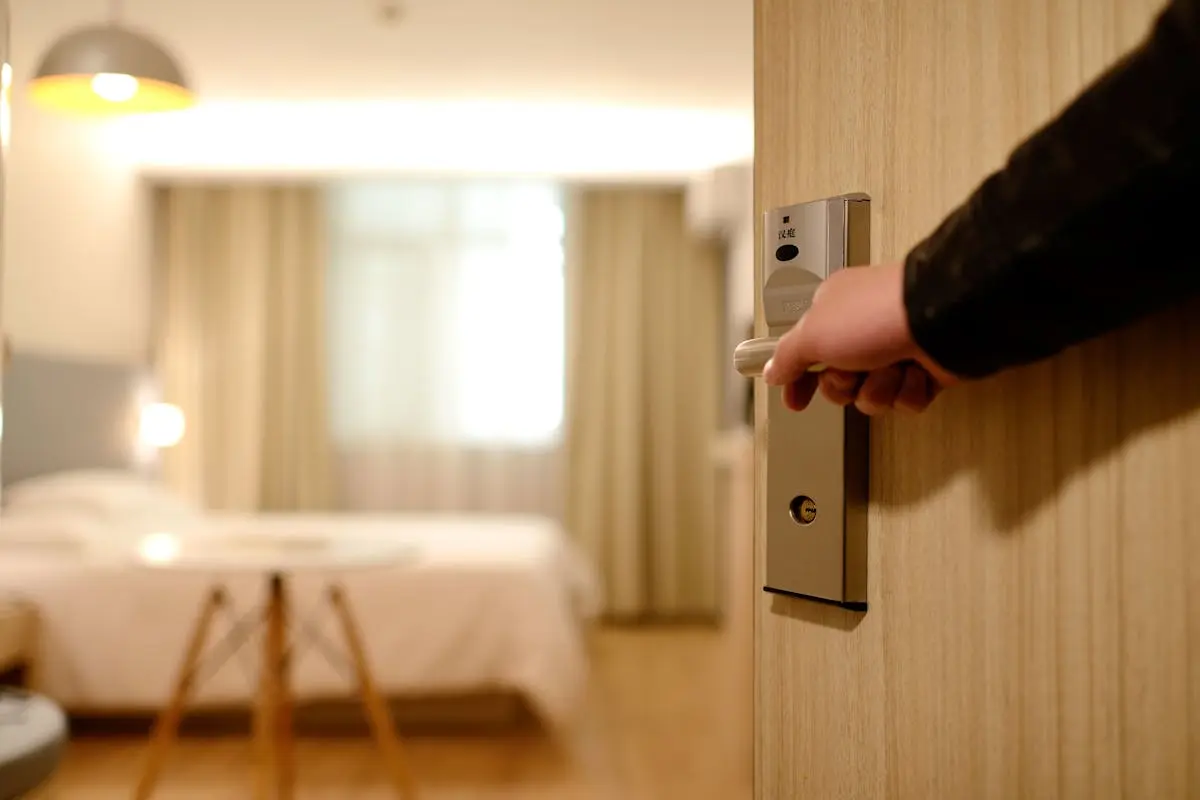Artificial intelligence (AI) is not just a buzzword; it’s a game-changer that’s reshaping industries around the globe, and the hospitality sector is no exception. As hotels strive to create memorable experiences for their guests while optimizing their operations, AI technologies are stepping in to play a pivotal role. Let’s take a closer look at how AI is enhancing the hotel experience and addressing common challenges in innovative ways.
How AI Enhances Guest Experience
AI-powered chatbots and virtual assistants provide instant support, handling guest inquiries and booking requests efficiently. These tools are available 24⁄7, ensuring guests feel attended to at any time of the day.
AI algorithms are also capable of analyzing guest preferences by tracking past behaviors and feedback. This allows hotels to offer personalized experiences, such as room upgrades or customized itineraries, enhancing the overall satisfaction of guests. Imagine walking into your room where the music playlist is curated just for you based on your previous stay. Such personalized touches make guests feel valued and understood.
Moreover, AI in hospitality extends beyond just digital assistance. AI is integrated into physical interactions through robots providing room service. These robots navigate hotel corridors efficiently, delivering requested items directly to a guest’s room. It’s not just about convenience—it’s about consistency in service.
Personalized Interactions
But AI doesn’t stop there. It goes deeper by analyzing your past stays and preferences. For instance, if you’ve previously enjoyed a specific genre of music, the hotel might have your favorite playlist ready to greet you as you enter your room. These personalized touches not only enhance your comfort but also make you feel valued and understood—like your hotel truly knows you.
Imagine checking into a hotel where the staff already knows your name, your favorite drink, and even your preferred room temperature. This level of personalization can significantly enhance the overall guest experience. AI systems can track guest interactions and preferences over time, allowing hotels to build a comprehensive profile for each guest. This data can then be used to tailor services and offers, making every visit feel special.
Hotels leveraging AI must consider adopting Key AI Strategies to remain competitive. Adopting AI offers strategic advantages in enhancing both guest experiences and back-end operations. The American Hotel & Lodging Association’s findings suggest AI’s potential in predictive analytics and smart pricing, key components for thriving in today’s market.
Robots in Hospitality
Additionally, the integration of robots in hospitality is an exciting development. Picture a sleek robot gliding through the hotel corridors, delivering snacks or forgotten toiletries directly to your room. This isn’t just about convenience; it’s about ensuring that every aspect of service is consistent and efficient, allowing human staff to focus on creating those warm, personal interactions that guests cherish.
For example, the Aloft Hotels chain has introduced a robot named “Botlr,” which can deliver items to guests’ rooms. This not only adds a fun element to the hotel experience but also allows staff to dedicate more time to personalized service. Guests can interact with the robot through a mobile app, requesting items like toothbrushes or snacks, and the robot will navigate the hotel to deliver them.
Streamlining Hotel Operations with AI
Behind the scenes, AI is working tirelessly to streamline hotel operations. Consider the complexities of managing inventory, controlling energy usage, and ensuring that staffing levels meet fluctuating demand. AI technology can predict when equipment might fail, allowing for timely maintenance that minimizes downtime and cuts costs.
Optimizing Staffing Levels
Operational efficiency is vital for profitability in the hotel industry. Imagine an AI system that automatically assigns rooms based on guest preferences and booking patterns, reducing the risk of overbooking and optimizing space usage. This not only enhances guest satisfaction but also allows hotel staff to dedicate more time to personalized service.
Moreover, AI can analyze historical data to predict busy periods and adjust staffing levels accordingly. For instance, if a hotel knows that a local event is likely to attract a large number of guests, the AI system can recommend increasing staff during that time to ensure that service remains prompt and efficient. This proactive approach helps hotels manage labor costs while still providing excellent service.
Energy Management and Sustainability
Energy management is another area where AI shines. With smart sensors, hotels can analyze usage patterns and adjust lighting, heating, and cooling systems to conserve energy during off-peak hours. This not only helps reduce operational costs but also aligns with the values of environmentally conscious travelers.
For example, some hotels are using AI to optimize their energy consumption by learning when guests are in their rooms and adjusting the temperature accordingly. If a room is unoccupied, the system can automatically reduce heating or cooling, leading to significant energy savings. This not only cuts costs but also demonstrates the hotel’s commitment to sustainability, which is increasingly important to today’s travelers.
Personalizing Services Through Data Analysis
The beauty of AI lies in its ability to analyze vast amounts of data to offer tailored recommendations. For example, if you frequently indulge in spa treatments during your stays, AI can ensure that you receive exclusive spa package offers when you check in. This targeted approach doesn’t just enhance your experience; it fosters brand loyalty by making you feel recognized and appreciated.
Dynamic Marketing Strategies
Real-time data analysis allows hotels to adjust services dynamically. During busy seasons, AI can suggest staffing adjustments or promotional offers based on guest behavior trends, ensuring that every guest has an optimal experience without overextending resources. This adaptability is crucial in a fast-paced environment where guest expectations are continually evolving.
Hotels can also leverage AI to enhance their marketing strategies. By analyzing guest data, hotels can identify trends and preferences, allowing them to tailor their marketing campaigns more effectively. For instance, if a hotel notices that a significant number of guests are interested in wellness programs, they can create targeted promotions for spa treatments or yoga classes, driving higher engagement and conversion rates.
In-Room Technology
Engaging guests with in-room AI systems, such as smart speakers, can further elevate their stay. Imagine asking your smart speaker about local attractions or requesting to adjust the room temperature—all at your fingertips. This level of convenience transforms a standard hotel stay into a personalized experience.
Hotels can enhance these systems by integrating local information, such as restaurant recommendations and event schedules, making it easy for guests to explore the area. This not only enriches their experience but also encourages them to engage more with the hotel’s services.
AI in Security and Safety
Advanced systems, including facial recognition and automated alerts, help maintain a secure environment for both guests and staff. Picture a hotel where AI-driven behavior analytics can detect unusual patterns, alerting security personnel before a situation escalates.
Proactive Security Measures
Intelligent surveillance cameras not only record footage but also interpret potential threats in real-time. This proactive approach to security ensures that guests can focus on enjoying their stay without worrying about their safety. For instance, if a camera detects suspicious behavior, it can automatically alert security staff, allowing them to respond quickly and effectively.
Moreover, AI can enhance emergency response protocols. In the event of a fire or other emergency, AI systems can analyze data from various sensors to determine the safest evacuation routes for guests and staff. This level of preparedness can significantly improve safety outcomes in critical situations.
Maintaining Guest Privacy
While enhancing security, it’s crucial for hotels to balance safety measures with guest privacy. Many guests may feel uneasy about being monitored, so hotels must be transparent about their security practices. Clear communication about the use of AI for security purposes can help build trust and reassure guests that their privacy is a priority.
Challenges and Considerations in Implementing AI
While the advantages of AI are clear, the journey to implementation isn’t without challenges. Data privacy is a significant concern that hotels must navigate carefully. Guests want to feel secure in knowing that their personal information is protected. Additionally, the initial investment in AI technology can be substantial, which might deter some establishments.
Balancing Technology and Human Touch
A critical aspect to consider is maintaining the balance between technology and the human touch. AI can handle bookings and inquiries at lightning speed, but the warmth of human interaction is irreplaceable. Hotels should aim to enhance their AI systems to complement rather than replace the genuine connections that staff build with guests.
For example, while a chatbot can efficiently handle basic inquiries, there are times when a guest may prefer to speak with a human. Training staff to work alongside AI—using it as a tool rather than a replacement—can help maintain that essential personal touch that makes a hotel stay memorable.
Understanding the Investment
For those venturing into the world of AI, guidance from industry experts, such as the American Hotel & Lodging Association, can provide valuable insights. Understanding the capabilities and limitations of AI is essential for a successful integration that aligns with the hotel’s goals and guest engagement strategies.
Hotels must also consider the long-term benefits of AI investments. While the initial costs may be high, the potential for increased efficiency, improved guest satisfaction, and enhanced revenue can lead to significant returns on investment.
Future Trends in AI in Hospitality
As technology continues to evolve, the future of AI in the hospitality industry looks promising. Here are some trends to watch for:
Enhanced Personalization: As AI algorithms become more sophisticated, hotels will be able to offer even more personalized experiences. Imagine a hotel that not only remembers your preferences but can also anticipate your needs before you even arrive.
Voice Technology: The use of voice-activated technology is expected to grow. Hotels may implement more smart speakers in rooms, allowing guests to control their environment and access hotel services through voice commands.
Augmented Reality (AR): AR could be integrated into guest experiences, providing virtual tours of hotel amenities or local attractions, enhancing engagement and exploration.
AI-Driven Revenue Management: Hotels will increasingly rely on AI for dynamic pricing strategies. By analyzing market trends and competitor pricing, AI can help hotels optimize their rates in real-time, maximizing revenue.
Sustainability Initiatives: As travelers become more environmentally conscious, AI can play a role in helping hotels implement sustainable practices. From energy management systems to waste reduction strategies, AI can help hotels operate more sustainably.
Embracing AI for a Smarter Hotel Experience
As we look to the future, it’s clear that AI is revolutionizing the hospitality industry by personalizing customer experiences, optimizing operations, and offering predictive insights. Hotels that embrace this technology are not just improving efficiency; they are paving the way for a more connected and smarter future.
For hotels venturing into AI, understanding the Key AI Strategies from the American Hotel & Lodging Association’s webinar can offer guidance. It’s crucial to navigate the AI landscape with insight into its capabilities and limitations.
Ultimately, adopting AI in the hospitality industry demands a strategic approach. While the benefits are plenty, being conscious of the ethical implications and potential disruptions to traditional practices is essential for a successful AI journey.
In conclusion, the integration of AI in hotels is about more than just technology—it’s about creating meaningful experiences for guests while enhancing operational efficiency. As hotels continue to adapt and innovate, those that successfully leverage AI will likely see significant improvements in guest satisfaction and loyalty. The journey may come with challenges, but the rewards of a more personalized and efficient hospitality experience are well worth the effort.

